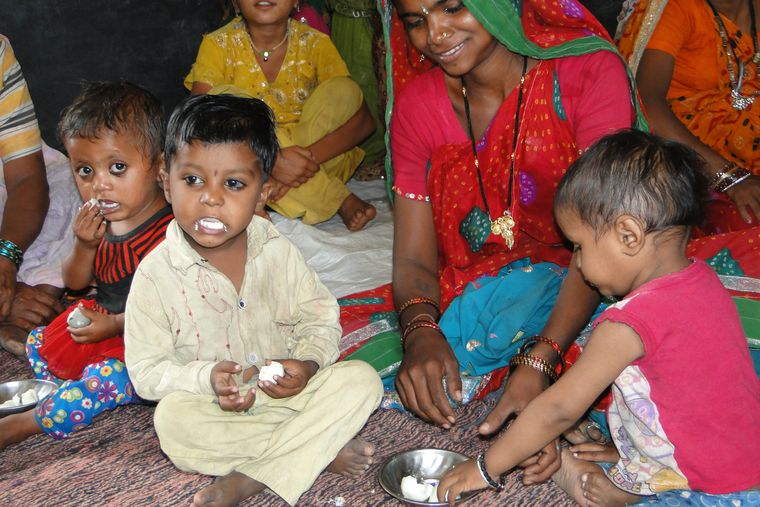Imarti Devi, Madhya Pradesh’s women and child development (WCD) minister, is known for her straight albeit rustic way of speaking. A strong advocate of serving eggs to children in anganwadis, Devi, on September 2, reiterated her desire to make it happen in her state.
But weeks later, Chief Minister Shivraj Singh Chouhan nullified his colleague's stand, saying, "Baccho ke liye andey nahi, doodh" (Milk, not eggs, for children). Devi softened her stance. The three-time MLA told THE WEEK that milk was the best option. Her determination to serve eggs lasted all of two weeks. "The chief minister and I have the same objective—to eradicate malnutrition from Madhya Pradesh," said Devi.
Facing a sensitive political situation, Devi could not afford to cross swords with Chouhan. In his earlier stints as chief minister, Chouhan, a strict vegetarian, refused the inclusion of eggs in anganwadi menus when it was brought up in 2009 and 2015.
Food rights activists have been left dejected after the recent developments dashed their hopes that children in malnutrition-ravaged Madhya Pradesh would finally get 'superfood' eggs. Politics, they say, has prevailed once again.
"Are the religious and political sentiments not hurt when 90,000 children below the age of five die every year in Madhya Pradesh, and when 45 lakh children face delayed or restricted development and growth?" asked food activist Sachin Jain. "Do our beliefs allow us to accept this?" Jain, who underlines the feasibility of eggs as a nutritious food or supplement, says the choice should be given to the children.
Statistics show that the highest malnutrition (per cent of underweight children) is among the SC (45.9 per cent) and ST (51.5 per cent) communities, compared to the state average of 42.8 per cent. Similarly, the percentage of stunted children among the SC (47.6 per cent) and ST (48.2 per cent) categories are higher than the state average of 42 per cent. A majority among the SC/ST communities in MP are non-vegetarians by choice, and 49.4 per cent of the entire state consumes non-vegetarian food.
"The welfare of vulnerable people is not a priority," said political commentator Shams Ur Rehman Alavi. "Rather, it is about stamping their own supremacy in every way, and the government also wants to keep the powerful communities happy. The egg politics is a good example of this."
The fact that only a handful of the 75 MLAs of SC and ST categories in the state have spoken about the issue gives credence to this thought. While Devi herself is from an SC community, her proposal received support only from a few other ST MLAs like Dr Hiralal Alawa and Dr Ashok Marskole, both of the Congress.
"There should not be any religious or cultural issue," said Marskole. "The children of poor families and backward communities should get eggs if they are willing to eat it. Eggs are a far better option [than milk] as they cannot be adulterated, have longer shelf life and can be given to children easily." Nutritionists prefer the combination of milk, eggs and protein-rich soybean, but agree that eggs are the most nutritious.
The scheme to give milk to children in Madhya Pradesh was originally launched in 2015, when it was decided that about 29 lakh anganwadi children and 45 lakh primary school children would get 100ml of flavoured milk thrice a week. The scheme has since suffered because of several bottlenecks and was carried out haphazardly. The only new detail in Chouhan's repackaged scheme is that the milk will be home delivered to identified children in moderate (about 7 lakh) and severe (about 84,000) malnutrition categories.
Swati Meena Nayak, director, WCD department, told THE WEEK that the existing budget provision on distribution of milk in anganwadis is being used to provide 250gm flavoured milk powder per month per child to the identified families. "Since the anganwadis are closed, the milk powder will be delivered home," she said. "It will come to about 10gm of milk powder per day for the child." The powder is to be mixed in warm water to get about 100ml of milk.
Social activist Ajmat says that when the chief minister decided to give milk instead of eggs in 2015, children did not like the taste and it got spoilt easily. "The scheme was discontinued in these districts," he said. "Malnutrition is higher in tribal areas where almost everyone [prefers] eggs. There is no visible alternative to it."
Reetika Khera, a development economist, added that other than the fact that religious sentiments are being used to further caste agenda, it is also an excuse for the government to spend less. "We compared the nutritional value of eggs and milk powder, and it is clear that 100gm of milk powder has more protein and vitamin A than one egg but lesser iron and vitamin D than the egg," she said. She added that 10gm of milk powder a day would not suffice.
Khera says she does not want to pitch eggs against milk. "Rather, one day it could be eggs, one day milk and another day soybean," she said.


